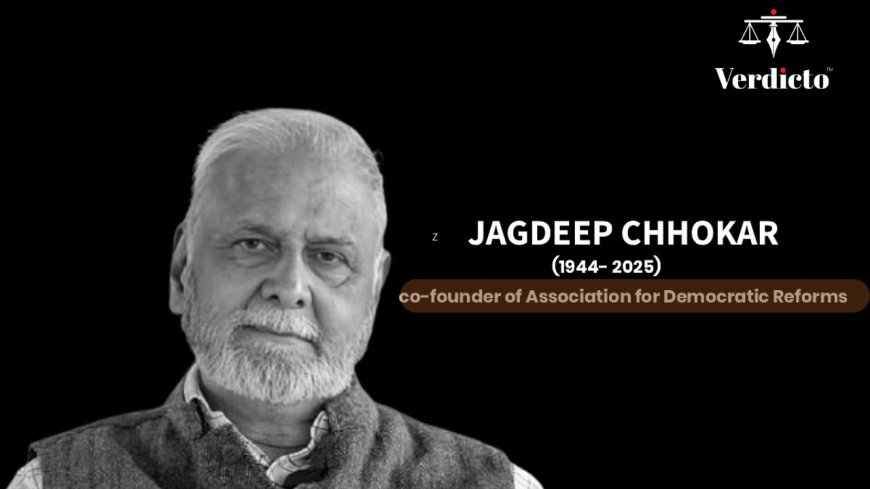Jagdeep Chhokar, Who Made Candidates Reveal Their Secrets, Passes Away at 80
Jagdeep S Chhokar, cofounder of the Association for Democratic Reforms and a relentless advocate for electoral transparency, passed away at 80. Over two decades, he spearheaded landmark Supreme Court rulings, exposed opaque political funding, and reshaped India’s democratic accountability.

Jagdeep S. Chhokar, educator, activist, and founding member of the Association for Democratic Reforms (ADR), passed away on Thursday morning following a heart attack. He was 80.
A relentless advocate for transparency and accountability in Indian politics, Chhokar spent over two decades pushing reforms that reshaped the country’s electoral landscape. He emerged as a key legal strategist behind several landmark Supreme Court judgments that mandated political parties to disclose candidates’ criminal records, financial assets, and educational qualifications—a watershed in the history of Indian democracy.
His death has sent shock waves across India’s civil society and academic circles. Among those who expressed condolences were RJD MP Manoj Kumar Jha, senior lawyer Sanjay Hegde, former election commissioner Ashok Lavasa, and journalist Maneesh Chhibber.
Jha said Chhokar had “forced the nation to look into the mirror of its electoral practices and confront the cracks beneath the surface of its democratic edifice.” Hegde wrote, “Rest in Power sir, you fought well to preserve India's democratic institutions and kept them on the right track.” Calling his passing tragic, Lavasa noted that ADR has “rendered yeoman service in maintaining high standards of electoral democracy. People like him & ADR are vital for questioning authorities, a healthy sign for any democracy.” Chhibber said the nation “will be poorer without you.”
Building a Movement for Electoral Reform
Chhokar co-founded ADR in 1999, pioneering the cause of electoral transparency at a time when discussions about political accountability were limited to closed circles. His efforts culminated in landmark Supreme Court rulings in 2002–2003, which made it mandatory for all candidates contesting elections to submit affidavits declaring their criminal, financial, and educational details to the Election Commission.
These rulings transformed the relationship between citizens and their representatives, making information accessible to voters like never before. Chhokar also led ADR’s efforts in creating the MyNeta database, an online platform that aggregates and presents candidate affidavits in a user-friendly format. The tool became a go-to resource for voters, journalists, and researchers during elections.
Challenging Political Funding
Chhokar’s activism extended to the murky domain of political financing. He was one of the earliest and most vocal critics of the electoral bond scheme, calling it a direct threat to democratic transparency. ADR filed petitions challenging the scheme, and in 2024, the Supreme Court struck it down as unconstitutional.
In an article for Newslaundry, Chhokar reminded readers that concerns about corporate funding of politics were not new. Quoting Justice M.C. Chagla from a 1975 case involving Tata Iron and Steel Company’s proposed political donations, he wrote: “It is a danger which may grow apace and which may ultimately overwhelm and even throttle democracy in the country.”
In another piece, Chhokar questioned why political parties should remain outside the ambit of the Right to Information (RTI) Act, pointing out that even the Chief Justice of India was subject to it.
Expanding Voter Choice
Among his many contributions was his advocacy for the introduction of the ‘None of the Above’ (NOTA) option on electronic voting machines. The Supreme Court accepted this argument in 2013, giving Indian voters the ability to reject all candidates—a symbolic but powerful tool of electoral dissent.
Legacy of a Relentless Reformer
Through litigation, scholarship, and public advocacy, Chhokar kept pushing India’s democratic institutions to uphold transparency and accountability. He combined the rigour of an academic with the persistence of an activist, leaving behind a body of reforms that have fundamentally reshaped Indian elections.
His passing marks the loss of one of India’s most steadfast defenders of democratic accountability. Yet, the systems he helped institutionalise—the mandatory disclosures, MyNeta, the fight against opaque funding, and NOTA—will continue to empower generations of voters.
📌 Follow us on YouTube, Instagram, and Twitter for more updates.







